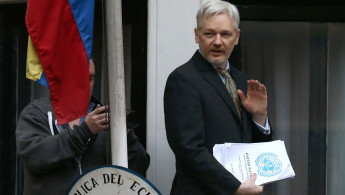Ecuador says it cut Wikileaks' founder's internet at embassy
Ecuador has admitted to cutting internet access to Julian Assange - who is holed up at its London embassy - due to his Wikileaks website releasing information which could impact on the US presidential election.
A trove of hacked emails from Hillary Clinton's presidential campaign have recently been released by Wikileaks, which appear to be an attempt to discredit the Democrat candidate.
It has led to accusations that Wikileaks is working to sway the election in favor of Republican Donald Trump, and perhaps at the behest of Russia.
"The government of Ecuador respects the principle of non-intervention in the internal affairs of other states. It does not interfere in external electoral processes, nor does it favor any particular candidate," the Ecuadoran foreign ministry said in a statement.
In consequence, the ministry said, it decided to "temporarily restrict" communications at the embassy.
US officials have formally blamed state-sponsored Russian hackers for the hacking of internal emails from the Democratic Party and other institutions.
On Monday WikiLeaks accused Ecuador of cutting off Assange's internet communications at the behest of US Secretary of State John Kerry, citing "multiple US sources", which Washington has denied.
"While our concerns about WikiLeaks are longstanding, any suggestion that Secretary Kerry or the State Department were involved in shutting down WikiLeaks is false," State Department Spokesman John Kirby said Tuesday.
"Reports that Secretary Kerry had conversations with Ecuadorian officials about this are simply untrue. Period."
Ecuador reaffirmed its decision to grant Assange asylum, and said the restriction on communications at its embassy did not hinder WikiLeaks itself.
"This temporary restriction does not prevent the WikiLeaks organisation from carrying out its journalistic activities," it said.
Assange fled to Ecuador's London embassy in June 2012, after facing extradition to Sweden to face a rape accusation.





 Follow the Middle East's top stories in English at The New Arab on Google News
Follow the Middle East's top stories in English at The New Arab on Google News
![22 Arab countries at COP29 have rejected the targeting of fossil fuels [Getty]](/sites/default/files/styles/image_330x185/public/2024-11/GettyImages-2184289638.jpg?h=199d8c1f&itok=ptHl5bec)
![Dozens of people turned out for the funerals [Getty]](/sites/default/files/styles/image_330x185/public/2024-11/GettyImages-2185229760.jpg?h=e7c891e8&itok=1bctDcE6)
![The UAE is widely suspected of arming the RSF militia [Getty]](/sites/default/files/styles/image_330x185/public/2024-11/GettyImages-472529908.jpg?h=69f2b9d0&itok=Yauw3YTG)